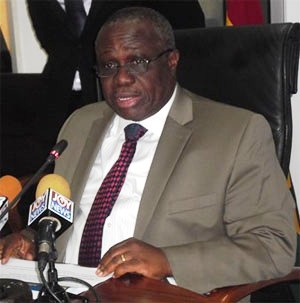Dalex Finance and Leasing Company CEO, Kenneth Kwamina Thompson, has predicted that interest rates on government securities, especially Treasury bills, could hit 37 percent this year.
He has further predicted that the cedi, which is currently under some pressure, could fall to GH¢6 to US$1; inflation will rise to 25 percent this year while government’s fiscal indiscipline continues.
These, he said, are in spite of the imminent IMF bailout deal expected by April to enhance investor confidence in the economy, since the bailout money will be delayed due to government inability to meet some of the IMF’s conditionalities.
“The conditionalities will be painful and the cash relief will be back-loaded; government will not meet its targets set in the conditionalities, leading to major cash relief being delayed or withdrawn.”
These, he said, will lead to a major slowdown in all economic indicators, as it becomes obvious that the government will overshoot significantly its spending targets
Mr. Thompson, speaking at a CIMG-organised event on the topic “Crystal Ball Gazing: The Ghanaian Economy in 2015”, believes that due to government’s excessive appetite for borrowing and uncontrolled spending, the interest rate on T-bills will have to be increased to attract more investors.
“Ghana government has not put in place an effective mechanism to control government spending and check fiscal indiscipline. The government will continue to borrow domestically to finance spending and crowd out finance to the private sector. Interest rates will continue to rise in 2015, especially after the first quarter. Treasury bill rates may get to 37percent,” he said.
Already the Bank of Ghana has scheduled February 19 to auction government's 3-year fixed rate bond to raise GH¢630million from the capital market to refinance government's debts maturing in the first half of this year.
The amount to be raised next month is the first of two 3-year fixed rate bonds government has planned to issue this year. The coupon rate for the bond is expected to reflect the highest competitive bid accepted at the auction for the security.
Earlier this year, the Bank of Ghana revealed government's intention to borrow GH¢25.42billion from the domestic market within the first six months of the year: an amount that is twice the GH¢12.72billion it borrowed through the issuance of government securities in the same period last year.
According to the government's debt issuance plan for the first half of this year, in February alone it is expected to raise about GH¢4.15billion through various securities including Treasury bills, 1-year and 2- year fixed notes.
Already, President John Mahama has said that the country could lose almost US$700million in revenue due to the fall in oil prices, a figure that could put government's budget deficit target of 6.5 percent of GDP out of range.
It is thus feared that the risks posed to the economy could push investors to demand a higher interest rate on the bond and make government's debt more expensive.
This year, government has budgeted GH?8billion as interest payment for domestic debts -- out of the total GH?9.5 billion -- raising concerns that debt overhang may cause government to be unwilling to implement adjustment programmes that will promote economic growth, because a greater proportion of the benefits will end up as debt-service payments to creditors.
The country's total debt stock as at September last year is about 60.8 percent of GDP, translating to more than GH¢69billion including interest payments -- which puts a severe strain on government's finances.
In 1995 T-bill rates were as high as 45 percent with inflation at an all time high of 70.8 percent. In 1996 and 1997, T-bill rates stood at 47.88 and 47.53 percent respectively while inflation stood at 32.7 and 20.5 percent respectively.
The highest rate of T-bills in the new century was recorded in 2000, when it stood at 41 percent with inflation at 40.5 percent. Mr. Thompson believes that T-bill rates and inflation can go higher.
“Between where we are now and 30 percent is not far off. Non-Bank Financial Institutions (NBFIs) are borrowing above 30 percent and people are pushing for high and higher rates, especially when most people are not sure which way the currency will go; so they need the higher rates to compensate them in case of any cedi-devaluation.
“The current Bank of Ghana leadership is not independent and fails to check fiscal indiscipline. It will continue to print more money to finance fiscal deficit, which will increase inflation,” he said. Government’s borrowing is killing the private sector, meanwhile the private sector is the largest employer. Government is trying to raise funds to manage the debt, but it is not cutting spending.”
Business News of Friday, 13 February 2015
Source: B&FT













